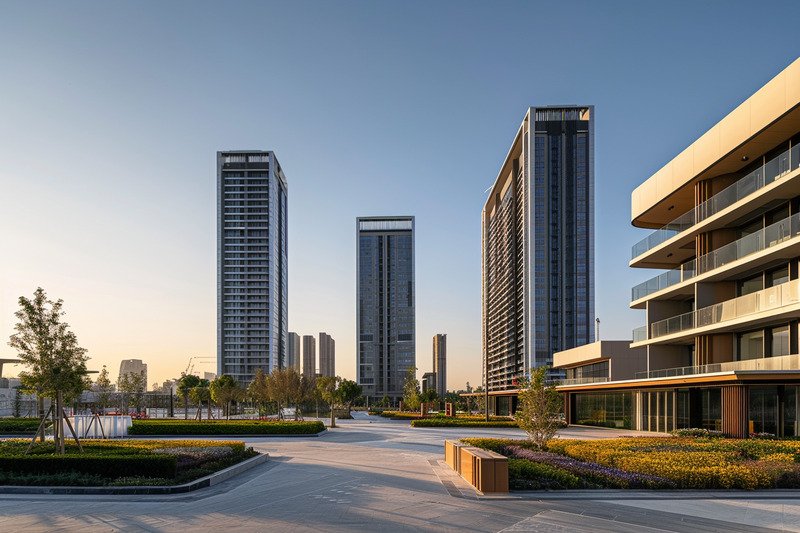What to Do Once Your Offer Is Accepted

Congratulations on your accepted offer in Dubai's vibrant real estate market! As you embark on this exciting journey, it's crucial to navigate the next steps carefully. The process in Dubai has unique aspects that differ from other global markets. From obtaining your No Objection Certificate (NOC) to finalizing your mortgage, each step requires attention to detail and timely action.
Understanding Dubai's property laws and regulations is essential during this phase. You'll need to work closely with your real estate agent and legal advisor to ensure compliance with local requirements.
One of your first tasks will be to pay the initial deposit, typically 10% of the purchase price. This secures your commitment to the sale and initiates the formal process.
Arrange for a property inspection by a certified Dubai inspector. This step is crucial to identify any potential issues with the property before proceeding further.
Let us help you find the perfect property. Contact us to get started.
Begin the mortgage application process if you're financing the purchase. Dubai banks have specific requirements for expatriates and locals, so start this process early.
Obtain necessary approvals from the Dubai Land Department. This includes registering the sale agreement and ensuring all documentation is in order.
Review and sign the final sale contract. Ensure all terms and conditions align with your initial offer and any subsequent negotiations.
Prepare for the transfer of ownership at the Dubai Land Department. This involves paying remaining fees and obtaining the title deed in your name.
Key Takeaways
Navigating Dubai's real estate market requires specific steps once your offer is accepted. The emirate's unique property landscape, governed by local laws and regulations, demands careful attention to detail. From ensuring compliance with Dubai Land Department requirements to understanding the intricacies of freehold and leasehold properties, buyers must be well-informed. This guide outlines crucial actions to take after your offer is accepted, tailored to Dubai's real estate environment.
Schedule a property inspection with a Dubai Municipality-approved inspector. This step is crucial for assessing the condition of the property and identifying any potential issues unique to Dubai's climate and construction standards.
Finalize your mortgage application with a UAE-based bank or financial institution. Provide all necessary documentation, including proof of income, Emirates ID, and passport copies. Be prepared for stringent financial checks as per UAE Central Bank regulations.
Conduct a title deed verification through the Dubai Land Department. This ensures the property's ownership details are accurate and there are no outstanding mortgages or legal disputes associated with the property.
Negotiate any necessary repairs or modifications with the seller based on the inspection results. Be aware of Dubai's specific building codes and regulations when discussing potential changes or improvements to the property.
Plan your move by setting a date and arranging utilities through DEWA (Dubai Electricity and Water Authority). Notify relevant parties of your address change and familiarize yourself with your new neighborhood's amenities and services.
Schedule a Home Inspection
Once your offer is accepted on a Dubai property, prioritize scheduling a comprehensive home inspection. This crucial step helps identify potential issues before finalizing your purchase. Contact a licensed and experienced Dubai-based home inspector promptly, as their schedules can fill up quickly.
Plan to be present during the inspection, which typically takes 2-4 hours, depending on the property's size and condition. The inspector will examine the property's structural components, electrical systems, plumbing, HVAC, and other major elements. They'll look for signs of water damage, pest infestations, and safety hazards, considering Dubai's unique climate and building standards.
After the inspection, you'll receive a detailed report outlining their findings. Review this document carefully, as it'll help you make informed decisions about your Dubai real estate purchase. If significant issues are discovered, you may want to renegotiate the price or request repairs from the seller.
In some cases, you might decide to walk away from the deal if the problems are too severe. Remember, the home inspection is your opportunity to ensure you're making a sound investment in Dubai's competitive real estate market. Don't skimp on this crucial step in the property buying process.
Review Inspection Results
After receiving your Dubai home inspection report, it's crucial to thoroughly review the results and consider their impact on your property purchase. Carefully examine the report, focusing on major issues or safety concerns identified by the inspector. These may include structural problems, electrical or plumbing issues, or signs of water damage or mold in the harsh Dubai climate.
Categorize the findings into immediate concerns and less urgent matters. Consider the cost implications of necessary repairs or renovations, factoring in Dubai's unique construction standards and materials. Consult with your real estate agent or a trusted local contractor to better understand potential costs and timeframes.
Decide whether to proceed with the purchase as-is, negotiate repairs with the seller, request a price reduction, or walk away from the deal. The inspection results are a valuable tool in your negotiation process, especially in Dubai's competitive real estate market.
Seek professional advice if you're unsure about interpreting or acting on the inspection findings. Dubai's property laws and regulations may differ from other markets, so expert guidance is essential.
Negotiate Repairs or Credits
After receiving your Dubai property inspection results, you'll need to decide on negotiating repairs or credits with the seller. If significant issues were uncovered, you have several options. You can request the seller make necessary repairs before closing, ask for a credit to cover repair costs, or negotiate a reduced purchase price. Your decision should be based on the severity and nature of the issues found.
When negotiating repairs in Dubai, prioritize major structural problems, safety concerns, and costly system replacements. Be prepared to provide evidence from the inspection report to support your requests. Focus on items that genuinely affect the property's value or livability in the Dubai market.
If opting for credits instead of repairs, research estimated costs in Dubai to ensure you're requesting an appropriate amount. Sellers in Dubai may be more willing to offer credits rather than undertake repairs themselves.
Your Dubai real estate agent can guide you through this process, helping craft a fair and strategic negotiation approach. If the seller is unwilling to address significant issues, reassess whether the property is still a good investment in Dubai's real estate market.
Secure Your Financing
With negotiations settled, it's time to finalize your financing for your Dubai property purchase. If you've secured pre-approval, contact your lender to proceed with the full mortgage application. They'll require additional documentation, including the signed purchase agreement, property details, and updated financial information.
Be prepared to provide recent bank statements, pay stubs, and tax returns.
Your lender will order a property valuation to ensure the home's value aligns with the purchase price. This is particularly important in Dubai's dynamic real estate market. If there's a significant discrepancy, you may need to renegotiate or cover the difference out of pocket.
During this process, maintain your current financial situation. Avoid making large purchases, changing jobs, or applying for new credit, as these actions could impact your loan approval in Dubai's stringent financial environment.
Stay in close communication with your lender and respond promptly to any requests for additional information. They'll guide you through the underwriting process, which typically takes several weeks in Dubai.
Once approved, you'll receive a loan commitment letter outlining the terms of your mortgage. Review this document carefully, paying attention to Dubai-specific clauses and regulations. Clarify any questions before proceeding to the closing stage.
Purchase Homeowners Insurance
Securing homeowners insurance is crucial for protecting your Dubai property investment. Obtain coverage before closing to safeguard your home from potential risks.
Research reputable Dubai insurance providers and compare policies. Look for comprehensive coverage including protection against fire, theft, natural disasters, and liability. Consider factors like replacement cost, personal belongings coverage, and additional living expenses.
Inquire about specific requirements for Dubai properties, as they may differ from other locations. Request quotes from multiple insurers to ensure the best value for your coverage.
Provide your insurance agent with detailed information about your property, including age, construction materials, and security features. This helps accurately assess risks and determine appropriate coverage levels.
Review your policy annually and update it to reflect changes in your home's value or personal circumstances. Dubai's unique climate and environmental factors may influence insurance needs, so discuss these with your provider.
Consider additional coverage options specific to luxury properties or high-value items common in Dubai real estate. This may include specialized protection for fine art, jewelry, or high-end appliances.
Complete Title Search
Completing a thorough title search is a crucial step when purchasing property in Dubai. This process ensures the property has a clean title and no legal issues or encumbrances that could affect your ownership rights.
In Dubai, the title search involves examining records from the Dubai Land Department and other relevant authorities. To conduct a title search in Dubai, you'll need to engage a licensed real estate broker or a legal professional familiar with local property laws. They'll access the Real Estate Registration System (RERS) to verify ownership details and check for any registered mortgages or liens.
The title search in Dubai typically takes 3-5 working days. During this time, your representative will review the property's ownership history, confirm the seller's right to sell, and identify potential issues like outstanding service charges or legal disputes.
Upon completion, you'll receive a title deed report. Review this document carefully with your real estate agent or lawyer. If any issues arise, work with the seller to resolve them before finalizing the purchase.
Conduct Final Walkthrough
Before finalizing your Dubai property purchase, a final inspection is crucial. This typically occurs 24 to 48 hours before transfer and allows you to verify the property's condition hasn't changed since your last visit. During this inspection, you'll check that all agreed-upon modifications have been completed and no new issues have arisen. This step is particularly important in Dubai's dynamic real estate market, where rapid development and construction are common.
Begin by examining the exterior, including the façade and any outdoor spaces. In Dubai's climate, pay special attention to air conditioning systems and sun protection features.
Inside, test all appliances, light fixtures, and plumbing. Ensure all smart home features, common in Dubai's luxury properties, are functioning correctly.
Inspect walls, floors, and ceilings for any new damage or signs of water intrusion. This is crucial in a city with occasional sandstorms and high humidity.
Check that all items included in the sale are present and in the expected condition. In Dubai, this may include high-end furnishings or custom installations.
If you discover any issues, immediately notify your real estate agent to address them before the property transfer.
Prepare for Closing Costs
As you approach the final stages of your Dubai property purchase, it's crucial to prepare for closing costs. These expenses typically range from 2% to 5% of the property's value and can significantly impact your budget. Understanding and planning for these costs will ensure a smooth transaction.
Key closing costs in Dubai include the Dubai Land Department transfer fee, which is 4% of the property's value, and the real estate agent's commission, usually around 2% of the purchase price.
Other expenses to consider are mortgage registration fees, property valuation fees, and title deed issuance fees. If you're obtaining a mortgage, factor in arrangement fees and potential mortgage insurance costs.
Utility deposits and maintenance fees should also be accounted for in your budget. It's advisable to get a detailed breakdown of all expenses from your real estate agent or lawyer to avoid surprises.
Consult with a financial advisor to ensure you have sufficient funds available for all closing costs. Proper preparation will help you navigate the final steps of your Dubai property purchase with confidence.
Arrange Utilities and Services
Setting up utilities and services is crucial when moving into your new Dubai property. Begin by contacting the Dubai Electricity and Water Authority (DEWA) to arrange electricity and water connections. You'll need your tenancy agreement, passport copy, and Emirates ID to create an account. Schedule the activation date to align with your move-in day.
For internet and TV services, compare packages from providers like Etisalat or Du.
If your property uses gas appliances, contact building management or a local gas company for proper installation and safety checks.
Consider setting up a landline phone if needed, though many Dubai residents rely on mobile services.
Research additional services such as home cleaning, pest control, or landscaping, depending on your property type.
Remember to update your address with important contacts, including banks, employers, and government agencies, to ensure a smooth transition to your new Dubai home.
Plan Your Move
Moving to a new home in Dubai requires careful planning. Start by setting a firm moving date and creating a comprehensive timeline. Sort through your belongings, deciding what to keep, donate, or discard. This process will help determine the size of moving truck needed and the quantity of packing supplies required.
Research and book a reputable Dubai moving company, getting multiple quotes and checking reviews. For a DIY move, reserve your truck in advance. Develop a room-by-room packing strategy, labeling boxes clearly for easy unpacking. Once the moving company is booked or the truck is reserved, start packing well in advance of the move. Begin with non-essential items and work your way towards packing the essentials last. This will help make the unpacking process easier and ensure a smooth and easy movein process. Make sure to keep important documents and valuable items separate and easily accessible during the move. By staying organized and following a plan, you can minimize stress and have an easy movein process.
Notify important parties of your address change, including your employer, bank, and government offices. Cancel or transfer local services and subscriptions. If you have children, arrange for their school transfers in Dubai's education system.
For pet owners, ensure your animals are prepared for the move, including any necessary vaccinations or travel documents required by Dubai authorities. Create a detailed inventory of your possessions for insurance purposes and to track items during the move.
Consider Dubai's climate when packing, protecting sensitive items from heat and humidity. Familiarize yourself with Dubai's customs regulations to avoid issues with restricted items. Arrange for utilities to be connected at your new Dubai home before arrival.
Conclusion
Once your offer is accepted on a Dubai property, you're on the path to homeownership in one of the world's most dynamic cities. The journey ahead involves crucial steps unique to the emirate's real estate landscape. From scheduling inspections to finalizing finances, each phase requires attention to detail. You'll need to review reports, negotiate any necessary modifications, and secure appropriate insurance. As you prepare for the handover, plan your move and set up essential services. Stay organized throughout this process, keeping Dubai's specific regulations and customs in mind.
Schedule property inspections promptly. In Dubai, it's crucial to verify the condition of the property, especially in older areas. Hire reputable inspectors familiar with local building standards and potential issues common in the emirate's climate.
Review all reports carefully, paying attention to any structural concerns or maintenance issues specific to Dubai's environment. Negotiate repairs or adjustments with the seller if necessary, considering local practices and regulations.
Secure appropriate insurance for your Dubai property. This may include coverage for sandstorms, intense heat, or other regional environmental factors. Consult with local insurance providers to understand the best options for your new home.
Prepare for the property handover, which may differ from processes in other countries. Familiarize yourself with Dubai Land Department procedures and gather all necessary documentation, including your residency visa if applicable.
Plan your move and set up essential services. In Dubai, this includes registering for DEWA (Dubai Electricity and Water Authority) services and arranging for internet and television connections through approved providers.
Let us help you find the perfect property. Contact us to get started.






